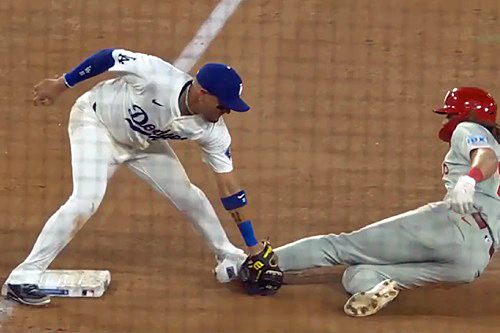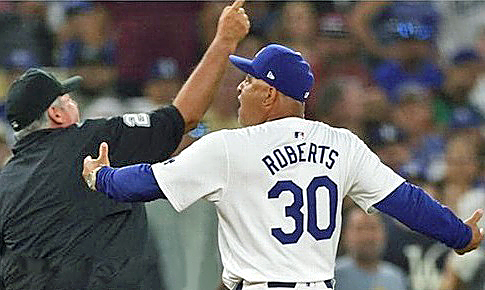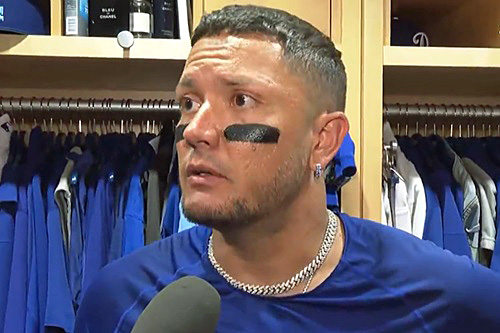Fifty-three-year-old Hunter Wendelstedt has been a Major League umpire since 1998 and has long been considered among the better umpires in the league.
Not any more.
During Wednesday’s game between the NL West first-place Los Angeles Dodgers and NL East first-place Philadelphia Phillies in front of a Dodger Stadium crowd of 45,003 (and millions more watching on television and listening on radio), the Atlanta, GA native made what will forever be remembered as one of the worst blown calls by a (so called) professional umpire, when he called Phillies third baseman Alec Bohm safe at third base when he was clearly out, claiming that Dodgers shortstop Miguel Rojas had obstructed the sliding Bohn when he most certainly had not.
Wendelstedt’s blown call ultimately led to an ugly 9-4 Dodgers loss to the Phillies.
The MLB glossary defines Obstruction as:
Obstruction describes an act by a fielder, who is not in possession of the ball or in the process of fielding it, that impedes the baserunner’s progress.
If a play is being made on the obstructed baserunner, the ball is ruled dead and the umpire can place all runners on the base he determines they would have reached without the obstruction. If no play is being made on the obstructed runner, the umpire will allow the play to progress until its natural conclusion and then impose any penalties he sees fit to nullify the act of obstruction.
It’s that “…who is not in possession of the ball or in the process of fielding it…” thing that the veteran umpire blatantly missed. Rojas was clearly already “in possession of the ball,” and clearly not “in the process of fielding it.”

(SportsNet LA)
As he well should have, Dodgers manager Dave Roberts immediately got in Wendelstedt’s face and argued that this was, in no way, even remotely close to obstruction. And for the first time this season, and as he well should have been, Roberts was ejected.

(SportsNet LA)
“He got it wrong, that’s just a fact” Roberts told reporters postgame. “Umpiring is hard. They do a great job. Tonight, that play affected the game.”
“I think this guy has seen this play a million times, and he just wanted some part of, I don’t know, part of a moment in the game,” said an understandably upset Rojas postgame. “And it’s really sad that it changed the whole context of the game for us, especially the way that we’re playing right now, trying to win games. It’s unfortunate that an umpire can change the narrative of a game and a series.”

(SportsNet LA)
Although it will never happen, Major League Baseball and even more so the Major League Baseball Umpires Association need to call out Wendelstedt’s egregious error, and he needs to publically acknowledge and apologize to Rojas, Roberts, the 45,003 eyewitnesses (and millions more watching on television and listening on radio) for it.
But here again, it will never happen.
Wendelstedt’s ego won’t allow for it.
Play Ball!
* * * * * *




 August 8th, 2024 at 8:00 am
August 8th, 2024 at 8:00 am  by Ron Cervenka
by Ron Cervenka  Posted in
Posted in 

Worst call in yrs. Might have cost us the game. In my opinion each team should get two challenges and every play on the field except for balls and strikes should be reviewable.
The power that the Major League Baseball Umpires Association (MLBUA) received following their strikes in 1979 and 1999 was insane. Like Rojas eluded to, they absolutely made the game about them.
I fear that it is going to get much worse before it gets better.
It really sucks that there are no repercussions for bad umpiring. They are basically tenured. Why should they work to improve when there are no consequences when they are bad..
Umpire was out of position to make the call — he should have asked for assistance. The rule change that took away fielders to “legally” block a bag with their foot or leg was needed, but umpire “judgment” calls implies that they exercise good judgment. In this case, the umpire’s judgment was terrible and took away an excellent defensive play by Kike and Miguel. Poor calls by umpires have impacted game results forever — it’s past time to increase the number of challenges available to teams.